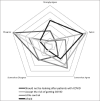Perceptions of healthcare workers in high-risk areas of a Singapore hospital during COVID-19: a cross-sectional study
- PMID: 33866717
- PMCID: PMC9678136
- DOI: 10.11622/smedj.2021046
Perceptions of healthcare workers in high-risk areas of a Singapore hospital during COVID-19: a cross-sectional study
Abstract
Introduction: There is worldwide concern over the psycho-emotional impact of COVID-19 on healthcare workers (HCWs). This study aimed to elicit HCWs' perceptions of the adequacy of protective measures in high-risk clinical areas and the factors associated with these perceptions.
Methods: This was a cross-sectional study conducted in April 2020. An anonymous electronic survey was sent via email to operating theatre (OT) and intensive care unit (ICU) staff of Sengkang General Hospital, Singapore.
Results: Of the 358 eligible participants, 292 (81.6%) responded to the survey. 93.2% of the participants felt that precautionary measures at work were sufficient and 94.9% acknowledged that adequate training was provided. More than 60% of the participants opined that their chances of contracting COVID-19 were moderate to high. Female gender, nursing occupation and duration of service <10 years were significantly associated with increased fear of contracting COVID-19, less control over occupational exposure and lower perceived need to care for COVID-19 patients. Having young children at home did not significantly affect these perceptions. The most important ICU precautions were availability of personal protective equipment outside the rooms of COVID-19 positive patients (95.3%) and having visitor restrictions (95.3%). The most important OT measures were having a dedicated OT for COVID-19 positive patients (91.2%) and having simulation as part of protocol familiarisation (91.7%).
Conclusion: Overall, there was high confidence in the adequacy of COVID-19 protective measures to prevent healthcare transmission in Singapore. The pandemic had a lower degree of psycho-emotional impact on HCWs here as compared to other countries.
Keywords: COVID-19; healthcare workers; pandemic; personal protective equipment; psychological.
Conflict of interest statement
None
Figures




References
-
- World Health Organization. Statement on the second meeting of the International Health Regulations (2005) Emergency Committee regarding the outbreak of novel coronavirus (2019-nCoV) [Last accessed on Mar 2020]. Available from: https://www.who.int/news-room/detail/30-01-2020-statement-on-the-second-...
-
- World Health Organization. Mental health and psychological resilience during the COVID-19 pandemic. [Last accessed on Apr 2020]. Available from: http://www.euro.who.int/en/health-topics/health-emergencies/coronavirus-... .
MeSH terms
LinkOut - more resources
Full Text Sources
Other Literature Sources
Medical
Miscellaneous

